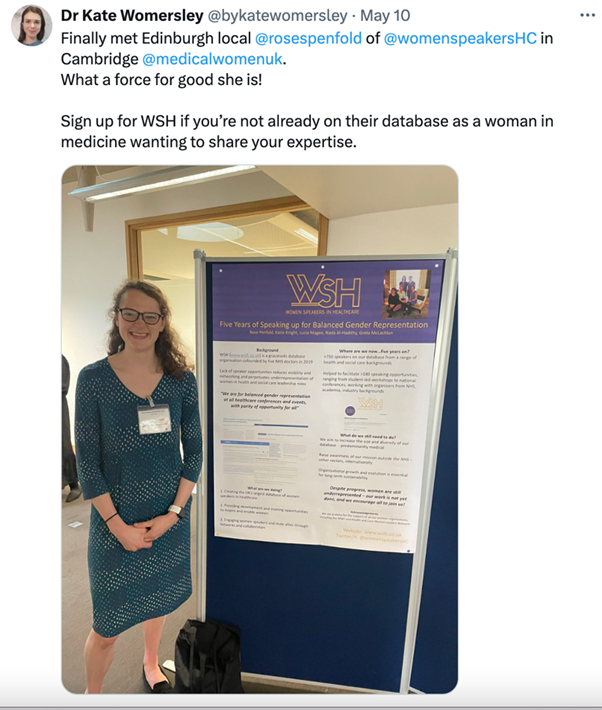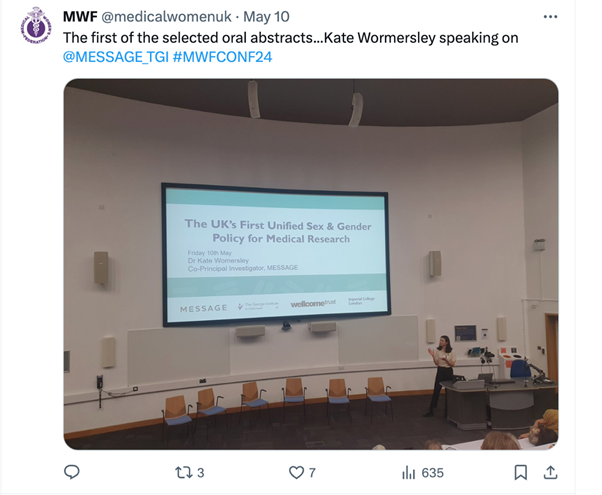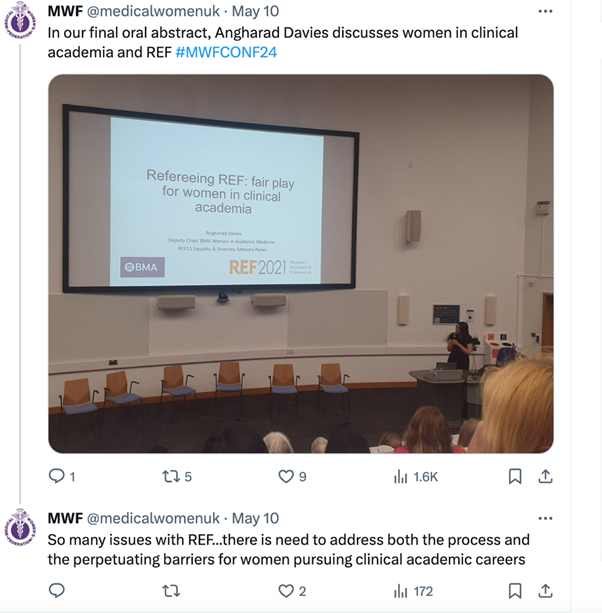I am very grateful for the support of the Lady Estelle Wolfson Conference Bursary, which facilitated my attendance at the MWF Spring Conference 2024 in Cambridge. I have been a member of the MWF for several years, and a junior doctor representative for London and now
representative for Scotland East since 2022.
It was a long journey down from Edinburgh – made longer by rail strikes the day of the conference – but so, so worth it! It was a packed couple of days – a delicious formal dinner set in the beautiful grounds of Downing College, supporting with delegate registration, a poster presentation, managing the Twitter account and listening to some amazing keynote talks, panel discussion, oral presentations and many inspiring chats over coffee and lunch. It is impossible to summarise the whole day in 500 words, but some key highlights presented below.
Main speakers
A few memorable messages:
“We are only as strong as our weakest link” – Miss Samantha Tross, Consultant Orthopaedic surgeon, speaking on ongoing issues of race, gender, and intersectional discrimination in the NHS.
“The key to progress is collaboration – and it doesn’t matter whose idea it was!” – Dame Professor Lesley Regan, describing how to drive forward change at scale.
“Until we have equality in women’s medicine, we need a Medical Women’s Federation” – panel discussion, chaired by VP Dr Nuthana Bhayankaram.
Poster presentations:
I enjoyed presenting “Women Speakers in Healthcare: Five Years of Speaking up for Balanced Gender Representation”. Women Speakers in Healthcare (WSH) (www.wsih.co.uk) is a grassroots database organisation, which I co-founded in 2019 alongside five NHS medical colleagues. We were brought together by a shared frustration that women remain underrepresented as speakers at healthcare conferences and events, despite comprising most of the health and social care workforce. Five years on, the database has grown to over 750 speakers from a range of health and social care backgrounds. We work with conference organisers and directly connect them with speakers for specific events. We have facilitated 180 speaker opportunities, ranging from local student-led workshops to national conferences, working with organisers from a range of NHS, academic and industry backgrounds. We continue to raise awareness of our work and wider issues affecting women in healthcare through blogs and a Twitter/ X network with over 4100 followers. The conference provided opportunity to speak to potential new speakers and to hear experiences of those who had worked with WSH as a speaker or conference organiser. This inspired me to continue with our mission, and suggested ideas for development and organisational growth.
I enjoyed exploring the other posters and speaking to the presenters – I was so impressed by the diversity of topics and presenters, and the number of medical students presenting at this national forum.

Oral abstracts:
I enjoyed listening to all of the presented abstracts…however, two struck home for me. The first was Dr Kate Womersley, speaking on her policy initiative MESSAGE (Medical Science Sex and Gender Equity), which brings together researchers, collaborators, and patient groups to co-develop best practice recommendations and a sex and gender policy framework for funders and regulators to improve gendered health outcomes in the UK. As a clinical academic, the talk made me reflect on my own research. How often do I look for sex- and gender disaggregated data in scientific papers that I read and review? And how often do I think about this in my own research projects, to ensure that these are inclusive and relevant?

The second was a talk by Professor Angharad Davies, Deputy Chair of the BMA Women in Academic Medicine committee. She spoke on the REF process, and how this is biased against people with protected characteristics, including women. Again, her talk triggered a lot of self reflection on my own future career path and the barriers that I may face as a clinical academic. It made me think about whether and how to effect change and throw down (and hold down!) the ladder and knock down barriers for future generations of women clinical academics.

Next steps
I am inspired to return to my clinical and academic work with a greater sense of purpose and affirmation. I plan to reach out to other MWF members in Scotland and to build our local network and drive change. We all need to continue raising awareness of the issues that
continue to disproportionately affect women working in medicine and women as patients.
Whilst we should acknowledge and celebrate progress, our work is far from done!
- Dr Rose Penfold, Geriatric Medicine Registrar & MWF Scotland East representative, recipient of the Lady Estelle Wolfson Bursary

